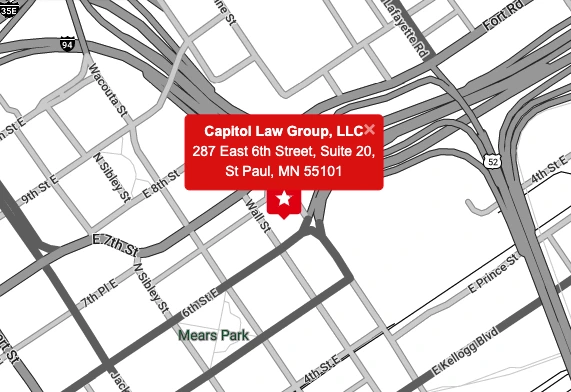A St. Paul Felony Lawyer Talks About Legal Theories

Rest assured that this blog will not be nearly as boring as the title implies. And, there is nothing boring about criminal charges if you or a loved one happens to be facing them.
All criminal charges are serious. Even misdemeanors have significant direct and collateral consequences. Fortunately, almost all criminal cases are defensible. A St. Paul felony lawyer just needs to know where to look to find them.
In one way or another, all these defenses relate to the burden of proof in a criminal case, which is beyond a reasonable doubt. Defendants are presumed innocent unless and until they are proven guilty. And, that proof must be so overwhelming that there are no reasonable questions as to the defendant’s guilt.
Procedural Defenses
Ramsey County prosecutors must have substantial evidence to meet their burden. So, if a St. Paul felony lawyer excludes such evidence, the chances of successfully resolving the matter go through the roof.
Many criminal cases, especially drug crimes and other infractions that require physical evidence, hinge on search warrants and search warrant exceptions.
The Fourth Amendment prohibits all unreasonable searches and seizures. Furthermore, under the exclusionary rule, any illegally obtained evidence is inadmissible in court. If officers did not have a warrant supported by probable cause, seized evidence might still be admissible if:
- Consent: Owners or apparent owners can consent to dwelling, vehicle, and other property searches. An apparent owner is someone like a car’s driver whose name is not on the title. Generally, consent is absolute and cannot be withdrawn. Once officers begin a consent search, they will not stop looking until they find what they want to find.
- Plain View: If officers are legally in a certain place, they may seize any contraband they find in plain view. If a driver stops for a DUI checkpoint and an officer sees a handgun under the seat, the officer can seize the gun. These seizures usually hinge on the legality of the stop or other law enforcement contact.
- Exigent Circumstances: The emergency exception is basically a combination of the previous two exceptions. If officers receive a distress call or otherwise believe someone is in danger, consent to search the premises is implied. However, the search is limited to plain view seizures.
Other common search warrant exceptions include stop-and-frisk searches, automobile searches, and searches after lawful arrests.
The Miranda rule is another procedural point. When custodial interrogation begins, police officers must give suspects their Miranda rights, which are the right to:
- Remain silent and
- Contact an attorney.
Miranda rights also include admonitions. For example, it’s not enough to tell suspects they have a right to remain silent. Suspects must also know that whatever they say can be used against them.
“Custodial interrogation” is a rather controversial phrase for St. Paul felony lawyers. This phase begins when suspects do not feel free to leave and when officers ask even seemingly benign questions. So, custodial interrogation arguably begins as soon as officers approach vehicles. However, officers almost never Mirandaize suspects at that point. A St. Paul felony lawyer might be able to use the failure to timely Mirandize the defendant and exclude any statements or evidence.
St. Paul Felony Lawyers and Actus Rea
This phrase means a criminal act. As mentioned, prosecutors must prove the defendant committed a criminal act beyond any reasonable doubt. St. Paul felony lawyers need not prove anything. They only need to create doubt.
Significantly, there is a difference between immoral and illegal. Sex crimes are a good example. Many sex acts are immoral, at least in the eyes of some jurors. However, they are not illegal in the eyes of the law.
Mens Rea
A criminal state of mind is an element in moat criminal cases. Once again, Ramsey County prosecutors must establish mens rea beyond a reasonable doubt. The state typically uses physical evidence to prove things like:
- Intentionally: Generally, “intentional” means “not accidental.” Intentionally is not synonymous with maliciously or spitefully. Additionally, intent is often limited. For example, intent to cause a physical injury is not an element of most assault cases. A harmful or offensive touch is usually enough.
- Knowingly: A few crimes, mostly possession crimes, have this means rea requirement. In possession cases, defendants must know they have a certain item. They do not need to know it was illegal. As the old saying goes, ignorance of the law is no excuse.
- Recklessly: Only a handful of crimes have this mental state requirement, mostly because “recklessly” is arguably not a criminal state of mind. It’s a step above negligently, which is usually synonymous with accidentally.
Regulatory offenses, like DWI, have no mental requirement. People do not need to intentionally, knowingly, or even recklessly drive drunk, at least in most cases. Knowledge might be an element in some drugged driving prosecutions, but that’s the subject of another blog.
Normally, voluntary intoxication is not a mens rea defense. However, some offenses, such as aggravated assault, are specific intent crimes. The defendant must intend both the conduct (hitting the alleged victim) and the result (seriously injuring the alleged victim). As a matter of law, intoxicated people cannot take that second mental step.
Contact a Dedicated Attorney
All criminal cases have lots of moving parts, and the state has the burden of proof on each one. For a free consultation with an experienced St. Paul felony lawyer, contact Capitol City Law Group, LLC. Go online now, call us at 651-705-8580, or stop by 287 6th St E, Suite 20, St Paul, MN 55101.




